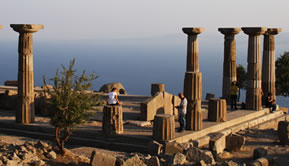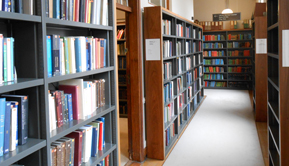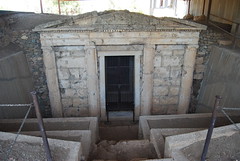Dr John Taylor, for many years Head of Classics at Tonbridge School, is now Lecturer in Classics at the University of Manchester. He is an experienced examiner in Ancient Greek and the author of many books, including Greek to GCSE and Greek Beyond GCSE. He spoke to Caroline Mackenzie for ARGO.
 Dr John Taylor (© Freddie Pedlar)
Dr John Taylor (© Freddie Pedlar)
I was educated at state schools in Rochdale and I started Latin at the age of 12, and Greek at 14. I dropped both Geography and Chemistry to do Greek: that was my first experience of how useful it is to have a classicist as headmaster. I should like to pay tribute to my first Greek teacher, Colin Gledhill. By the end of the first term we knew all about Indo-European, Grimm’s law and Cornish words that resembled Greek ones, and we had done a few of the marvellously dotty Herodotean stories in Wilding’s Greek for Beginners, such as ‘How the Egyptians avoided gnats’.
A very clever student I taught began his UCAS personal statement by saying he couldn’t honestly claim to have been fascinated by Greek myths in his paddling pool at the age of two, nicely inverting the usual topos, and I would have to say the same. I do remember a Sunday School lesson on St Paul’s travels when I was about eight with slides of Corinth and Ephesus, and thinking it all looked quite interesting, but I didn’t really get going until I started the languages.
I remember my first ever visit to Greece very clearly. It was a wonderful school trip in the lower sixth. We went on a cruise ship from Italy (that is the only time I’ve been through the Corinth Canal). As a student I went to Greece three times by train. I have been, I think, 37 times altogether and about half of those were school trips. I never tire of the main sites and I have enjoyed walking in mountainous parts of northern Greece and the Peloponnese. But I have been to relatively few islands. I would like to visit Delos and Patmos.
My parents were very supportive generally, and my mother had enjoyed Latin at school, but I didn’t have any relatives who had been to university. I had at various stages been interested in Art, Maths and History, but I had settled on classics by the time I did O-levels. I was at Oxford (Exeter College) as an undergraduate, then I did a PGCE at Durham and returned to Oxford for my doctorate on English historians of Greece in the eighteenth and nineteenth centuries. It was all good fun. At Oxford, I particularly enjoyed Richard Jenkyns’s lectures that later became his book The Victorians and Ancient Greece. That really directed my attention to the history of the classical tradition and reception.
I wanted to teach from a fairly early age (before that I had wanted to be an architect), but I had no specific plan beyond that. My first job was at Leeds Grammar School for four years (1982-6). I was then Head of Classics at St Francis Xavier’s College in Liverpool for six years (1986-92) and Head of Classics at Tonbridge for 22 years (1992-2014). I took early retirement from there for family reasons and started teaching at Manchester University in 2015. I can claim the vicarious distinction of having worked for two classicist headmasters who have published translations of both Homeric epics: Anthony Verity at Leeds, and Martin Hammond at Tonbridge.
I started as a tutor at the JACT (Joint Association of Classical Teachers) Greek Summer School at Bryanston in 1986 and have missed only three years since then. I was Director of Studies for twelve years (1993-2004) and I have been Director (a job that rotates) five times. 1986 was also the first year at Bryanston: the summer school was founded by David Raeburn [interviewed in ARGO 12] in London in 1968 and was then at Dean Close School in Cheltenham for many years. The summer school has an incomparable atmosphere, created by shared interest, intense focus and a full programme.
‘What are the most important lessons I hope to teach my students?’ is a big question. I guess I should like to persuade them that the ancient world is interesting, language is interesting, and you should study what you enjoy. Beyond that, perhaps have an open mind, but don’t believe everything you read.
I think the traditional order of learning Latin before embarking on Ancient Greek is probably sensible. Latin has more obvious links to English and a clearer grammatical structure - it’s a building with the plumbing on the outside. At a more advanced level, in terms of flexibility of sentence structure, arguably Greek is more like English than Latin is. But in the early stages, and particularly with derived words, it is easier to get a hold on Latin. However, if you don’t know any Latin, don’t let that stop you learning Ancient Greek.
Should Ancient Greek be spoken? No, not really. It’s fine as an occasional diversion and it’s certainly important to learn to read it aloud, though I am not a purist about pronunciation because we don’t really know how it was pronounced. But I wouldn’t advocate anything like the so-called ‘direct method’ which is currently undergoing quite a revival in Latin teaching. I don’t want to teach the ablative absolute in Latin: that’s just bonkers. It’s hard enough in English. But I know that some people think differently.
The differences between teaching school pupils and university students are less than you might think. I have enjoyed both, but teaching undergraduates is quite similar to good sixth form, just going further. With the languages you’re often doing with students who started them at university things that others who started earlier will have done at GCSE and A-level.
There has never been a better time to study classics. During my teaching career in schools there has been a steady increase in bureaucracy, management and regulation generally, all of which I deplore. Within the subject, conversely, there has been a revolution not only in the range and richness of resources available, but also in their user-friendliness.
My advice to prospective classics teachers is ‘Go for it, you won’t regret it’. I wouldn’t want to have done anything else. More specifically: get a PGCE, pursue your own studies while you are teaching, take trips abroad, get involved in setting and marking public exams. I was chief examiner for GCSE Greek for several years and it is illuminating (if also sometimes depressing) to see what mistakes students make.
The teaching of Ancient Greek won’t die out through lack of advocates. Its hold in schools is somewhat precarious but reasonably steady. A new Intermediate Certificate (testing roughly the first half of the GCSE language course) is currently in preparation. It will be endorsed initially by the Classical Association, Classics for All and several universities. It is to fill a gap - we don’t envisage it will be done much by people who are also going to do GCSE, but if students start a course and are going to find GCSE a struggle, they can do this instead. Or it may be suitable for those studying Greek outside the school timetable. The project is at an early stage but there will be a pilot sitting of the examination next summer (2022) and it will be generally available the following summer (2023). We have created a website with more information about it, including a specimen paper, mark scheme and all sorts of other resources. (See: https://intermediategreekcert.com/) We hope that this will be a useful development.
There is a great deal of interest among adult students beginning to learn Greek, including retired people doing it with U3A (the University of the Third Age). There is a lot of it going on in the country. When asked about their motivation, these adult learners most often cite a wish to read Homer or the New Testament in the original language.
In 1999 there was some alarm in the profession when the number of students doing GCSE Greek fell below 1000 for the first time. A-Level numbers fell below 250 at about the same time. This resulted in a survey of about 100 schools being undertaken by the Greek Committee of JACT and it was as a result of that survey that I wrote Greek to GCSE. The number of GCSE candidates did increase quite a bit (up to about 1375) in the following years, particularly when the half GCSE was available. In recent years, the numbers have been about 1100.
I wrote my Greek textbooks because of dissatisfaction with what was available, in particular a lack of focus on GCSE requirements. I do not of course advocate just teaching for the test, but the need for a streamlined course became urgent with the increasing move to teaching both Greek and Latin in one option slot in the timetable. In a crowded curriculum with many compulsory subjects, it is hard enough to persuade pupils to devote one option to classics, let alone two, and this idea, of doing ‘two for the price of one’, which seems to have occurred to a number of people simultaneously from about 1990, seemed the best way of protecting Greek.
Once you start writing books it’s hard to stop. You get more ideas and people suggest other things. Writing Greek to GCSE led on to more advanced Greek books and to Latin equivalents. In all the books I have been guided by experience of what students find difficult. The approach is fairly traditional - I have tried to present the grammar in a logical sequential order, so that one thing builds on another, and you can cross reference to things the students have already learned, and cut down the amount of rote learning. It is obviously desirable to have continuous passages from the earliest possible stage, but not at the expense of heavy glossing of things that cannot yet be understood, which gives only the illusion of reading. That just encourages putting it together like a jigsaw so I try not to gloss whole phrases that can’t at that point be explained.
I often use the analogy of piano tuition. However traditional or radical your approach is, everyone now would accept that it is desirable to play a tune at the earliest possible opportunity. You don’t want to be doing just scales and arpeggios for months on end.
I was at one of David Raeburn’s plays in New College antechapel a couple of years ago and there were some people a few seats back – presumably teachers – talking about my books. One of them said, “Greek Beyond GCSE is very good for getting students through A-level, but he does oversimplify by making it seem more regular than it is.” While that was intended as a criticism, I actually took it as a compliment, because in some ways I am trying to do just that. If my books make Greek seem more regular, predictable and simple than it actually is, then the opposite trap (into which some books do fall) is to make it seem more confused and random than it is. Psychologically, it is far better to learn the basics and get them totally secure and then look at variations. There should be light and shade, with emphasis on things that are going to be important and built on. The attempt to see more of a structure than there sometimes is, is not a bad thing.
The feedback on the Greek textbooks has generally been very positive, and come from a wide range of people. Despite the titles, they are not just used in schools but also by adults learning Greek as a hobby, and to some extent in universities. The books also sell internationally, although of course in some countries the order of the cases of nouns is presented differently, which can be a hurdle.
Once you have written one book the pace accelerates. I started writing Greek to GCSE in 1999. I had a sabbatical term at Corpus Christi, Cambridge, in the summer of that year. I was working on two other projects as well - one was New Testament Greek: A Reader, the other was the Greek Anthology, both in the Reading Greek series, and I did a lot of preliminary reading for the Greek to GCSE course. I committed to having enough material ready for September 1999 that a set of boys coming into the school could start the new course. I wrote it as they were studying it and it was finished to all intents and purposes by the summer of 2002, so that was three years of work. It took a lot longer than any of the subsequent books. I used to think seeing a book advertised in the Duckworth (as it was then) catalogue was a great stimulus to getting on and writing it. I always used to tell myself that Handel wrote the Messiah in three weeks so I was sure that I could write Latin Beyond GCSE in the Easter holidays, which I did in 2009. So for my books, one extreme was three years and the other extreme was three weeks. I really enjoyed writing the books - I wouldn’t have done them otherwise.
I have also written another book, Classics and the Bible: Hospitality and Recognition. I describe this in the preface as an amateur sketch of a big subject, and that is exactly what it is. What I am interested in is story-patterns which are often similar in the two traditions – classical literature and the Bible – even where direct influence or a common source is unlikely. That takes us to things like flood stories, epic journeys and (what I mainly concentrate on) theoxenies, i.e. stories about disguised divine visitors, or what the Epistle to the Hebrews calls ‘entertaining angels unawares’. I also explore the themes of hospitality and recognition as metaphors for the relationship between the two traditions and our perception of it.
One of the experiences of reading is that we recognise ourselves within books. The whole concept of recognition and sudden understanding of the pattern of past events or your own life is a very widespread theme. Stories of recognising a divine visitor sitting at the table are not only interesting in themselves but also symbols of something much wider.
In Homer’s Odyssey there is the whole story pattern of the disguised Odysseus and the dramatic irony that comes from the reader’s or audience’s knowledge of who he is when other people don’t know. Mark’s Gospel is incredibly similar. There is an American scholar, Dennis MacDonald, who thinks that Mark and in fact pretty much all the New Testament writers knew Homer intimately. I am not sure I do believe that but, in some ways, if Mark did not know Homer then the similarity is all the more remarkable.
Another example, perhaps, of people seeing themselves in the characters was when I was teaching a usually reticent sixth-form class who were stung into passionate debate when asked whether they sided with the authoritarian Pentheus or the subversive Dionysus. When Bacchae was performed in Greek at Bradfield College in 1973, the boy due to play Dionysus was expelled just beforehand. It seems that behind the scenes he had become rather too Dionysiac and someone else had to learn the part rather quickly.
I am currently working on an edition of the Acts of the Apostles (the Greek text with introduction, translation and commentary) which perhaps more than any other work illustrates the intersection of the biblical and classical worlds. It also provides an outsider’s view of Roman provincial administration. The edition is aimed at people who have not been doing Greek for very long and, on the one hand, people who are learning Greek who might not know much about the Bible, but conversely also Theology students who don’t know much about the classical background.
As for other projects, for a long time I have been planning to do a little introductory book on Pausanias and his guide to Greece.
My favourite Greek playwright is Aristophanes. The comedies are hugely inventive and nothing else brings classical Athens to life in the same way. G.M. Young said of the 19th century and historical studies generally that you should read until you can hear people talking. In Aristophanes we do hear believable people talking. What, if any, serious message Aristophanes is putting across, and where he stands politically, is a much debated topic. The best play for most people and the most performable by a million miles is Frogs and that is really because it keys into tragedy and Aristophanes’ view of Aeschylus and Euripides. The reason it works as a play is that the agon (the contest between the two) is in the second half whereas in most of his plays the agon is in the first half. For most people, after the middle punctuation mark, where the chorus come forward and express a few views, the play peters out. You see the results of people trying to scupper what’s been achieved by the hero, or to enjoy it, but you do feel that the momentum has gone a bit. Peace is rather flat in the second half. But this raises interesting questions about whether our perception of the unity, development and shape of a play is necessarily the same as the Greeks’. A pretty close second favourite of mine is Acharnians - that was one of the first set texts I studied in detail at university and I am still very interested it.
It’s hard really to like Achilles, though of course we get swept up in his tragic story. My favourite Homeric hero, for approachable amiability, would be Hector, but I think overall it has to be Odysseus. Allegorical interpretation isn’t fashionable, but it was avidly pursued in the ancient world and I think at some level the Odyssey is about us facing the world’s tempestuous sea. That is the way that both Horace and the Stoics read it. The Iliad shows us that life is a battle and the Odyssey that life is a journey. I do think that is part of the reason why both epics remain appealing.
I have no strong views on Homer’s identity or gender, but I do think we need to posit one organising intelligence for each epic. To me, it is not credible that works of such complexity just coagulated from oral tradition: I think the new availability of writing stimulated the creation of the Iliad, over many years and probably by dictation, and that a written text was produced in the poet’s lifetime. The Odyssey is probably a generation later, produced in much the same way, possibly by the same poet in old age, but more probably by that poet’s son, apprentice or admirer; in other words, a close associate who has lived with or been taught by and learned from the Iliad poet and who has detailed knowledge of the Iliad.
When considering the highlights of my career so far, I think of some of the ablest people I’ve taught, students who really keep you on your toes; but also of dawning comprehension or unexpected enthusiasm in the less talented. Then I think of standing on the top of Acrocorinth on the last morning of a successful school trip (that basically means you have got through the last night without incident), taking in the incomparable view over the Isthmus - it doesn’t get much better than that.
The classicist who has most inspired me was E R Dodds, former Regius Professor of Greek at Oxford. I did Euripides’ Bacchae for A-level and I thought his commentary was one of the most interesting books I had ever read. It was a privilege to meet him (twice) in his old age when I was a student. He would be my classical hero. Casting the net a bit more widely, I would choose Patrick Leigh Fermor - his books about Greece are wonderful, but his masterpiece is A Time of Gifts, about the first part of his walk across Europe in the 1930s.
The Athenian versions of democracy and freedom were far from perfect, but the ideals remain worth defending in a world where they have powerful opponents. As another example of the legacy of ancient Greece, I think we might also ponder how the Athenian theatre managed to be both high culture and popular entertainment at the same time.
If I had to save just one Greek text from a fire, it would be Herodotus. It is endlessly interesting, and one of the few texts you can open anywhere, start reading and be immediately hooked. Herodotus is just a genius storyteller. I think of that old interleaved copy in the film of The English Patient, with its own story to tell. One reason why Greek to GCSE was fun to write was because of the Herodotus. I recall a Saturday evening in the summer of 2001 - it was a lovely sunny evening - when I put my pen down and went for a walk. (This is like the story about Gibbon finishing his Decline and Fall of the Roman Empire and walking round his garden.) I had finished drafting the last of the Herodotus stories and I can remember thinking, ‘This has been fun because of Herodotus’. People have asked me whether writing the Latin book was as much fun and my answer is that the stories from Livy are good but not anywhere nearly as good as those from Herodotus. If you go through an author like Livy or Herodotus with the aim of picking out the essence of the story, putting it into simpler words and shortening it, the Herodotus stories have a quality that the stories of Livy, for all their merits, just don’t have.
I have been very impressed by the new Cambridge Greek Lexicon, which has been 20 years in the making. James Diggle (who led the project) is the most famous classicist from my old school in Rochdale.
I have to admit that after fifty years I can still never remember the endings for Greek verbs with omicron contraction. I find them so counterintuitive.
The story about me being mobbed by ‘fans’ on the Acropolis is apocryphal but it is true that I have been asked at Athens airport to sign copies of my books. I do like hailing other teachers by name when they are with their school groups at classical sites. That is part of the fun of the profession. Classics is a small world and a very co-operative, unified one. This takes us back to my earlier point about schools and universities as I have never really felt that there is any great gulf between the two in classics.
‘The teacher, being wise, teaches wisely.’ ‘If you do not listen, you will not learn.’
If you read any of the classic children’s books there is a sense that they are for children at one level but there are things in them that adult readers will more easily see. I think my inclusion of practice sentences in Greek to GCSE, such as the ones above, was deliberate. I hope the students will get something out of them but there is a level of irony that is there more for the teachers. I do sometimes try to translate sentences that will bring a smile, such as ‘Take me to your leader’. I have been trying to think of the Greek for ‘They think it’s all over… it is now.’









